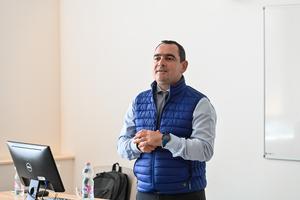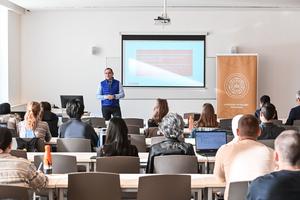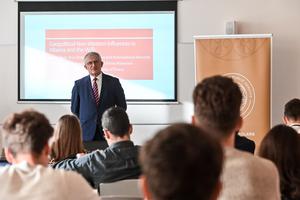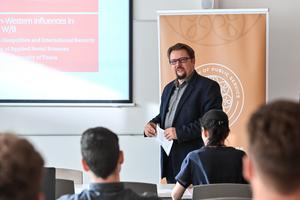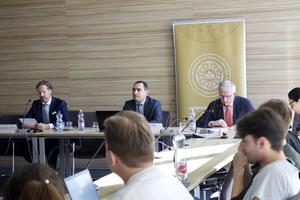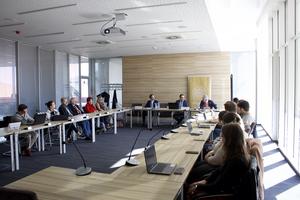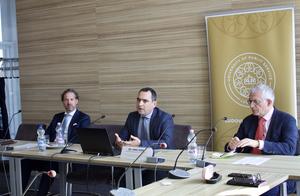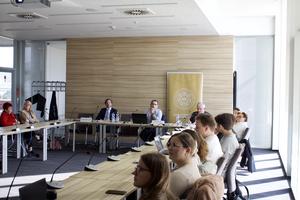In the framework of the Ludovika Scholars Program, Enri Hide, Professor at the Faculty of Law, Political Science and International Relations, European University of Tirana (Universiteti Europian i Tiranës) delivered a public lecture and an exclusive workshop at the Faculty of Public Governance and International Studies. The two events focused on the Western Balkans region, its changing geopolitical significance and the new challenges facing the countries in this part of Europe.
At the guest lecture, the professor was welcomed by Péter Krisztián Zachar, Vice Dean for International Affairs of the Faculty, and then Ambassador Dr Iván Gyurcsík, Director of the Ludovika Scholars Program, presented the role and importance of the guest lecturer program in the internationalisation of the university.
In his presentation, Enri Hide described the difficulties and challenges faced by the Balkan countries and the power they represent in the international arena. He analysed in detail statistical and political indicators to explain why all actors in the region are considered weak states. In doing so, he has examined not only institutional weakness and political instability but also the concentration of power, some indicators of democratic deficit, religious and ethnic divisions and exposure to external actors. In his presentation, Enri Hide focused on the elements that determine the functioning of the state, in particular the security architecture, with particular reference to the influence of the major international alliance systems that define the region, such as NATO and the EU, and the actors of great power politics. He also analysed other actors present in the region, in particular, the presence of organised crime and extremist groups organised along national or religious lines, as a key challenge.
He pointed out that even the countries considered the richest in the region in terms of economic development barely reach 50% of the EU average GDP per capita. The region faces a serious problem of inadequate employment, with a very high number of people earning a living in informal jobs without social security. This has also contributed to the fact that in the last 10 years alone, nearly 600,000 people have left Albania, mainly young, well-educated intellectuals. This brain drain phenomenon, which has a serious impact on the region, is exacerbated by the relatively low birth rates in the countries under review and the resulting ageing of the population as a major challenge. This has repercussions on the region's school system and social institutions and, thus, on the social security of the society that remains.
In his lecture, Enri Hide pointed out that the traditional external powers of the Western Balkans - Austria, Turkey and Russia - are no longer as active in the region as they were in previous centuries when they were in their imperial era. However, all three still have a significant presence: Austria maintains a strong presence in the framework of financial institutions in the Balkans, Russia is very active in the energy sector, and Turkey is one of the largest trade and investment partners in the region, and as a NATO member can also make a significant contribution to the stability of the region. As a new non-Western actor, China has also been increasingly present in the region, with its own infrastructure, through the Belt and Road Initiative. This could create a particularly tense situation with the emergence of new fault lines. The countries of the Western Balkans will have to decide whether to commit themselves to Western institutions and Western integration or to closer cooperation with non-Western powers.
Professor Enri Hide discussed some aspects of the region's development in a workshop with experts, in particular, the possibilities for scientific cooperation. The meeting was attended not only by lecturers of Ludovika-UPS but also by staff from the Ministry of Foreign Affairs and Trade, Corvinus University, and the Migration Research Institute, among others, who were able to learn not only about the research and internationalisation strategy of the European University of Tirana, but also about priority research projects and the institution-building efforts of the Albanian higher education.
Text: International Division, FPGIS, LUPS
Photos: András Szabó, Dénes Szilágyi
